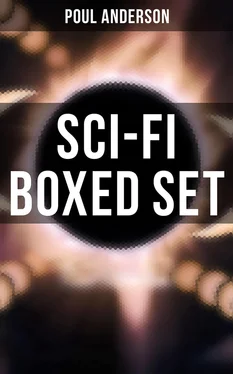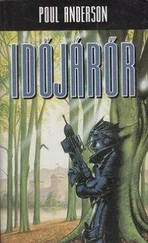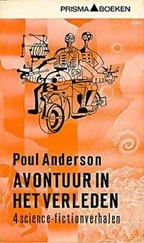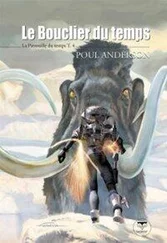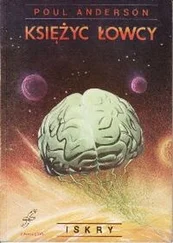He should have provided against this. He should have rigged a bomb, to blow the whole pyramid to hell—
With an effort, he stopped the frantic racing of his mind and looked around. There were paintings on the walls, dim with age but still legible, pictographs, meant perhaps for the one who finally found this treasure. The men of New Egypt were shown, hardly distinguishable from humans—dark of skin and hair, keen of feature, tall and stately and robed in living light. He had paid special attention to one representation. It showed a series of actions, like an old time comic-strip—a man taking up a glassy object, fitting it over his head, throwing a small switch. He had been tempted to try it, but—gods, what would it do?
He found the helmet and slipped it gingerly over his skull. It might be some kind of last-ditch chance for him. The thing was cold and smooth and hard, it settled on his head with a slow massiveness that was strangely— living . He shuddered and turned back to the machines.
This thing now with the long coil-wrapped barrel—an energy projector of some sort? How did you activate it? Hell-fire, which was the muzzle end?
He heard the faint banging of feet, winding closer down the endless passageways. Gods, his mind groaned. They didn't waste any time, did they?
But they hadn't needed to ... a metal detector would have located his boat, told them that he was in this pyramid rather than one of the dozen others scattered through the valley. And energy tracers would spot him down here....
He doused the light and crouched in darkness behind one of the machines. The blaster was heavy in his hand.
A voice hailed him from outside the door. "It's useless, Solman. Come out of there!"
He bit back a reply and lay waiting.
A woman's voice took up the refrain. It was a good voice, he thought irrelevantly, low and well modulated, but it had an iron ring to it. They were hard, these Janyards, even their women led troops and piloted ships and killed men.
"You may as well surrender, Solman. All you have done has been to accomplish our work for us. We suspected such an attempt might be made. Lacking the archeological records, we couldn't hope for much success ourselves, but since my force was stationed near this sun I had a boat lie in an orbit around the planet with detectors wide open. We trailed you down, and let you work, and now we are here to get what you have found."
"Go back," he bluffed desperately. "I planted a bomb. Go back or I'll set it off."
The laugh was hard with scorn. "Do you think we wouldn't know it if you had? You haven't even a spacesuit on. Come out with your hands up or we'll flood the vault with gas."
Laird's teeth flashed in a snarling grin. "All right," he shouted, only half aware of what he was saying. "All right, you asked for it!"
He threw the switch on his helmet.
* * * * *
It was like a burst of fire in his brain, a soundless roar of splintering darkness. He screamed, half crazy with the fury that poured into him, feeling the hideous thrumming along every nerve and sinew, feeling his muscles cave in and his body hit the floor. The shadows closed in, roaring and rolling, night and death and the wreck of the universe, and high above it all he heard—laughter.
He lay sprawled behind the machine, twitching and whimpering. They had heard him, out in the tunnels, and with slow caution they entered and stood over him and watched his spasms jerk toward stillness.
They were tall and well-formed, the Janyard rebels—Earth had sent her best out to colonize the Sagittarian worlds, three hundred years ago. But the long cruel struggle, conquering and building and adapting to planets that never were and never could be Earth, had changed them, hardened their metal and frozen something in their souls.
Ostensibly it was a quarrel over tariff and trade rights which had led to their revolt against the Empire; actually, it was a new culture yelling to life, a thing born of fire and loneliness and the great empty reaches between the stars, the savage rebellion of a mutant child. They stood impassively watching the body until it lay quiet. Then one of them stooped over and removed the shining glassy helmet.
"He must have taken it for something he could use against us," said the Janyard, turning the helmet in his hands; "but it wasn't adapted to his sort of life. The old dwellers here looked human, but I don't think it went any deeper than their skins."
The woman commander looked down with a certain pity. "He was a brave man," she said.
"Wait—he's still alive, ma'm—he's sitting up—"
Daryesh forced the shaking body to hands and knees. He felt its sickness, wretched and cold in throat and nerves and muscles, and he felt the roiling of fear and urgency in the brain. These were enemies. There was death for a world and a civilization here. Most of all, he felt the horrible numbness of the nervous system, deaf and dumb and blind, cut off in its house of bone and peering out through five weak senses....
Vwyrdda, Vwyrdda, he was a prisoner in a brain without a telepathy transceiver lobe. He was a ghost reincarnated in a thing that was half a corpse!
Strong arms helped him to his feet. "That was a foolish thing to try," said the woman's cool voice.
Daryesh felt strength flowing back as the nervous and muscular and endocrine systems found a new balance, as his mind took over and fought down the gibbering madness which had been Laird. He drew a shuddering breath. Air in his nostrils after—how long? How long had he been dead?
His eyes focused on the woman. She was tall and handsome. Ruddy hair spilled from under a peaked cap, wide-set blue eyes regarded him frankly out of a face sculptured in clean lines and strong curves and fresh young coloring. For a moment he thought of Ilorna, and the old sickness rose—then he throttled it and looked again at the woman and smiled.
It was an insolent grin, and she stiffened angrily. "Who are you, Solman?" she asked.
The meaning was dear enough to Daryesh, who had his—host's—memory patterns and linguistic habits as well as those of Vwyrdda. He replied steadily, "Lieutenant John Laird of the Imperial Solar Navy, at your service. And your name?"
"You are exceeding yourself," she replied with frost in her voice. "But since I will wish to question you at length ... I am Captain Joana Rostov of the Janyard Fleet. Conduct yourself accordingly."
Daryesh looked around him. This wasn't good. He hadn't the chance now to search Laird's memories in detail, but it was clear enough that this was a force of enemies. The rights and wrongs of a quarrel ages after the death of all that had been Vwyrdda meant nothing to him, but he had to learn more of the situation, and be free to act as he chose. Especially since Laird would presently be reviving and start to resist.
The familiar sight of the machines was at once steadying and unnerving. There were powers here which could smash planets! It looked barbaric, this successor culture, and in any event the decision as to the use of this leashed hell had to be his. His head lifted in unconscious arrogance. His! For he was the last man of Vwyrdda, and they had wrought the machines, and the heritage was his.
He had to escape.
* * * * *
Joana Rostov was looking at him with an odd blend of hard suspicion and half-frightened puzzlement. "There's something wrong about you, Lieutenant," she said. "You don't behave like a man whose project has just gone to smash. What was that helmet for?"
Daryesh shrugged. "Part of a control device," he said easily. "In my excitement I failed to adjust it properly. No matter. There are plenty of other machines here."
"What use to you?"
"Oh—all sorts of uses. For instance, that one over there is a nucleonic disintegrator, and this is a shield projector, and—"
Читать дальше
